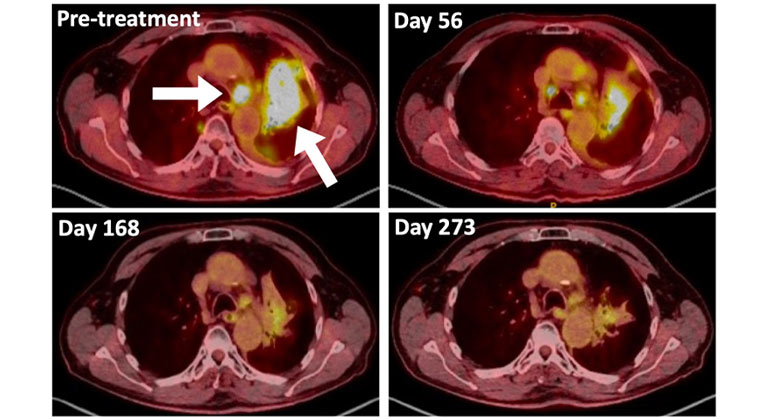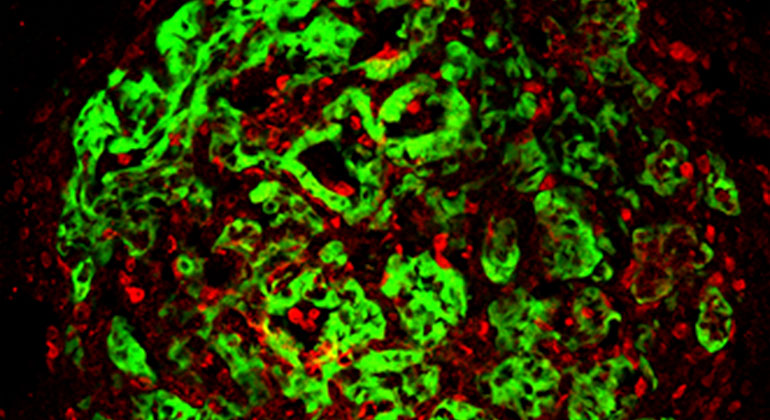A Type of Allergy Medicine Might Help Treat Lung Cancer, Research Suggests

Chest scans showing lung tumors in a patient with metastatic non-small cell lung cancer prior to and after receiving dupilumab with conventional immunotherapy. Image credit: LaMarche et al., Nature.
Researchers at the Icahn School of Medicine at Mount Sinai have identified an allergy pathway that, when blocked, unleashes antitumor immunity in mouse models of non-small cell lung cancer (NSCLC).
And in an early parallel study in humans, combining immunotherapy with dupilumab—an Interleukin-4 (IL-4) receptor-blocking antibody widely used for treating allergies and asthma—boosted patients' immune systems, with one out of the six experiencing significant tumor reduction.
The findings were described in the December 6 issue of Nature [DOI: 10.1038/s41586-023-06797-9].
“Immunotherapy using checkpoint blockade has revolutionized treatment for non-small cell lung cancer, the most common form of lung cancer, but currently only about a third of patients respond to it alone, and in most patients, the benefit is temporary,” says senior study author Miriam Merad, MD, PhD, Director of the Marc and Jennifer Lipschultz Precision Immunology Institute and Chair of the Department of Immunology and Immunotherapy at the Icahn School of Medicine at Mount Sinai. “A big focus of our program TARGET is to use single cell technology and artificial intelligence to identify molecular immune programs that can dampen tumor immune response to checkpoint blockade.”
Also known as a PD1 inhibitor, checkpoint blockade is a type of cancer immunotherapy that can unleash the cancer-killing activity of T cells.
“Using single cell technologies, we discovered that the immune cells infiltrating lung cancers, as well as other cancers we studied, exhibited characteristics of a 'type 2' immune response, which is commonly associated with allergic conditions like eczema and asthma,” says first study author Nelson LaMarche, PhD, a postdoctoral research fellow in the lab of Dr. Merad.
“These results led us to explore whether we could repurpose a medication typically used for allergic conditions to ‘rescue’ or enhance tumor response to checkpoint blockade,” says Thomas Marron, MD, PhD, Director of the Early Phase Trial Unit at Mount Sinai’s Tisch Cancer Center, and co-senior author of the study. “Strikingly, we found that IL-4 blockade enhanced lung cancer response to checkpoint blockade in mice and in six lung cancer patients with treatment-resistant disease. In fact, one patient whose lung cancer was growing despite checkpoint blockade had nearly all their cancer disappear after receiving just three doses of the allergy medication, and his cancer remains controlled today, over 17 months later."
The researchers are encouraged by the initial results but emphasize the need for larger clinical trials to validate the drug's efficacy in treating NSCLC. Beyond the clinical trial findings reported in the current Nature paper, the investigators have now expanded the clinical trial, adding dupilumab to checkpoint blockade for a larger group of lung cancer patients, and Dr. Marron recently received a grant from the Cancer Research Institute to study the effects in early-stage lung cancer as well. Through these trials, they are searching for biomarkers that can predict which cancer patients might benefit from dupilumab treatment and which may not.
“In our relentless pursuit of progress, the Cancer Research Institute (CRI) proudly supports the visionary team at the Icahn School of Medicine at Mount Sinai. Their findings validate our commitment to funding research across the entire discovery continuum, from the lab to clinical implementation, driven by cutting-edge technology and data. We're eager to witness our support delivering new hope by uncovering pathways to enhance checkpoint blockade responses. We champion this discovery and take pride in being part of its journey from lab to clinic, reinforcing our commitment to transforming lives.” says Jill O’Donnell-Tormey, PhD, CEO and director of scientific affairs at CRI.
The paper is titled “An IL-4 signaling axis in bone marrow drives pro-tumorigenic myelopoiesis.” Please see the Nature paper to view competing interests [DOI: 10.1038/s41586-023-06797-9].
The remaining authors, all with Icahn Mount Sinai except where indicated, are Samarth Hegde, PhD; Matthew D. Park, MD/PhD candidate; Barbara B. Maier, PhD, Icahn Mount Sinai and Austrian Academy of Sciences, Vienna; Leanna Troncoso; Jessica Le Berichel; Pauline Hamon, PhD, Meriem Belabed, PhD; Raphaël Mattiuz, PhD; Clotilde Hennequin; Theodore Chin; Amanda M. Reid; Iván Reyes-Torres, PhD; Erika Nemeth, MD, PhD candidate; Ruiyuan Zhang (Columbia University); Oakley C. Olson, PhD (Columbia University); Deborah B. Doroshow, MD, PhD; Nicholas C. Rohs, MD; Jorge E. Gomez, MD; Rajwanth Veluswamy, MD, MSCR; Nicole Hall; Nicholas Venturini, MD/PhD candidate; Florent Ginhoux, PhD (Agency for Science, Technology and Research, Singapore; Gustave Roussy Cancer Campus, France; Shanghai Jiao Tong University School of Medicine, China; and SingHealth Duke-NUS Translational Immunology Institute, Singapore); Zhaoyuan Liu, PhD (Shanghai Jiao Tong University School of Medicine, China); Mark Buckup, MD/PhD candidate; Igor Figueiredo; Vladimir Roudko, PhD; Kensuke Miyake, PhD (Tokyo Medical and Dental University, Japan); Hajime Karasuyama (Tokyo Medical and Dental University, Japan); Edgar Gonzalez-Kozlova, PhD; Sacha Gnjatic, PhD; Emmanuelle Passegué, PhD (Columbia University); Seunghee Kim-Schulze, PhD, Brian D. Brown, PhD; Fred R. Hirsch MD, PhD; Brian S. Kim, MD, MTR, FAAD; and Thomas U. Marron, MD, PhD.
The study was funded by National Institutes of Health grants CA257195, CA254104, CA154947, CA224319, DK124165, CA263705, CA196521, K00 CA223043, U01CA282114, and Cancer Research Institute grants CRI3931 and CRI3617, as well as by a Bristol Myers Squibb Irvington Research Fellowship (CRI3931) and a 2021 AACR-AstraZeneca Immuno-oncology Research Fellowship (21-40-12-MATT).
About the Icahn School of Medicine at Mount Sinai
The Icahn School of Medicine at Mount Sinai is internationally renowned for its outstanding research, educational, and clinical care programs. It is the sole academic partner for the eight- member hospitals* of the Mount Sinai Health System, one of the largest academic health systems in the United States, providing care to a large and diverse patient population.
Ranked 14th nationwide in National Institutes of Health (NIH) funding and among the 99th percentile in research dollars per investigator according to the Association of American Medical Colleges, Icahn Mount Sinai has a talented, productive, and successful faculty. More than 3,000 full-time scientists, educators, and clinicians work within and across 44 academic departments and 36 multidisciplinary institutes, a structure that facilitates tremendous collaboration and synergy. Our emphasis on translational research and therapeutics is evident in such diverse areas as genomics/big data, virology, neuroscience, cardiology, geriatrics, as well as gastrointestinal and liver diseases.
Icahn Mount Sinai offers highly competitive MD, PhD, and Master’s degree programs, with current enrollment of approximately 1,300 students. It has the largest graduate medical education program in the country, with more than 2,000 clinical residents and fellows training throughout the Health System. In addition, more than 550 postdoctoral research fellows are in training within the Health System.
A culture of innovation and discovery permeates every Icahn Mount Sinai program. Mount Sinai’s technology transfer office, one of the largest in the country, partners with faculty and trainees to pursue optimal commercialization of intellectual property to ensure that Mount Sinai discoveries and innovations translate into healthcare products and services that benefit the public.
Icahn Mount Sinai’s commitment to breakthrough science and clinical care is enhanced by academic affiliations that supplement and complement the School’s programs.
Through the Mount Sinai Innovation Partners (MSIP), the Health System facilitates the real-world application and commercialization of medical breakthroughs made at Mount Sinai. Additionally, MSIP develops research partnerships with industry leaders such as Merck & Co., AstraZeneca, Novo Nordisk, and others.
The Icahn School of Medicine at Mount Sinai is located in New York City on the border between the Upper East Side and East Harlem, and classroom teaching takes place on a campus facing Central Park. Icahn Mount Sinai’s location offers many opportunities to interact with and care for diverse communities. Learning extends well beyond the borders of our physical campus, to the eight hospitals of the Mount Sinai Health System, our academic affiliates, and globally.
-------------------------------------------------------
* Mount Sinai Health System member hospitals: The Mount Sinai Hospital; Mount Sinai Beth Israel; Mount Sinai Brooklyn; Mount Sinai Morningside; Mount Sinai Queens; Mount Sinai South Nassau; Mount Sinai West; and New York Eye and Ear Infirmary of Mount Sinai.
About the Mount Sinai Health System
Mount Sinai Health System is one of the largest academic medical systems in the New York metro area, with more than 43,000 employees working across eight hospitals, over 400 outpatient practices, nearly 300 labs, a school of nursing, and a leading school of medicine and graduate education. Mount Sinai advances health for all people, everywhere, by taking on the most complex health care challenges of our time — discovering and applying new scientific learning and knowledge; developing safer, more effective treatments; educating the next generation of medical leaders and innovators; and supporting local communities by delivering high-quality care to all who need it.
Through the integration of its hospitals, labs, and schools, Mount Sinai offers comprehensive health care solutions from birth through geriatrics, leveraging innovative approaches such as artificial intelligence and informatics while keeping patients’ medical and emotional needs at the center of all treatment. The Health System includes approximately 7,300 primary and specialty care physicians; 13 joint-venture outpatient surgery centers throughout the five boroughs of New York City, Westchester, Long Island, and Florida; and more than 30 affiliated community health centers. We are consistently ranked by U.S. News & World Report's Best Hospitals, receiving high "Honor Roll" status, and are highly ranked: No. 1 in Geriatrics and top 20 in Cardiology/Heart Surgery, Diabetes/Endocrinology, Gastroenterology/GI Surgery, Neurology/Neurosurgery, Orthopedics, Pulmonology/Lung Surgery, Rehabilitation, and Urology. New York Eye and Ear Infirmary of Mount Sinai is ranked No. 12 in Ophthalmology. U.S. News & World Report’s “Best Children’s Hospitals” ranks Mount Sinai Kravis Children's Hospital among the country’s best in several pediatric specialties.
For more information, visit https://www.mountsinai.org or find Mount Sinai on Facebook, Twitter and YouTube.

New Lung Immuno-oncology Therapeutic Strategy Identified
Apr 20, 2023 View All Press Releases